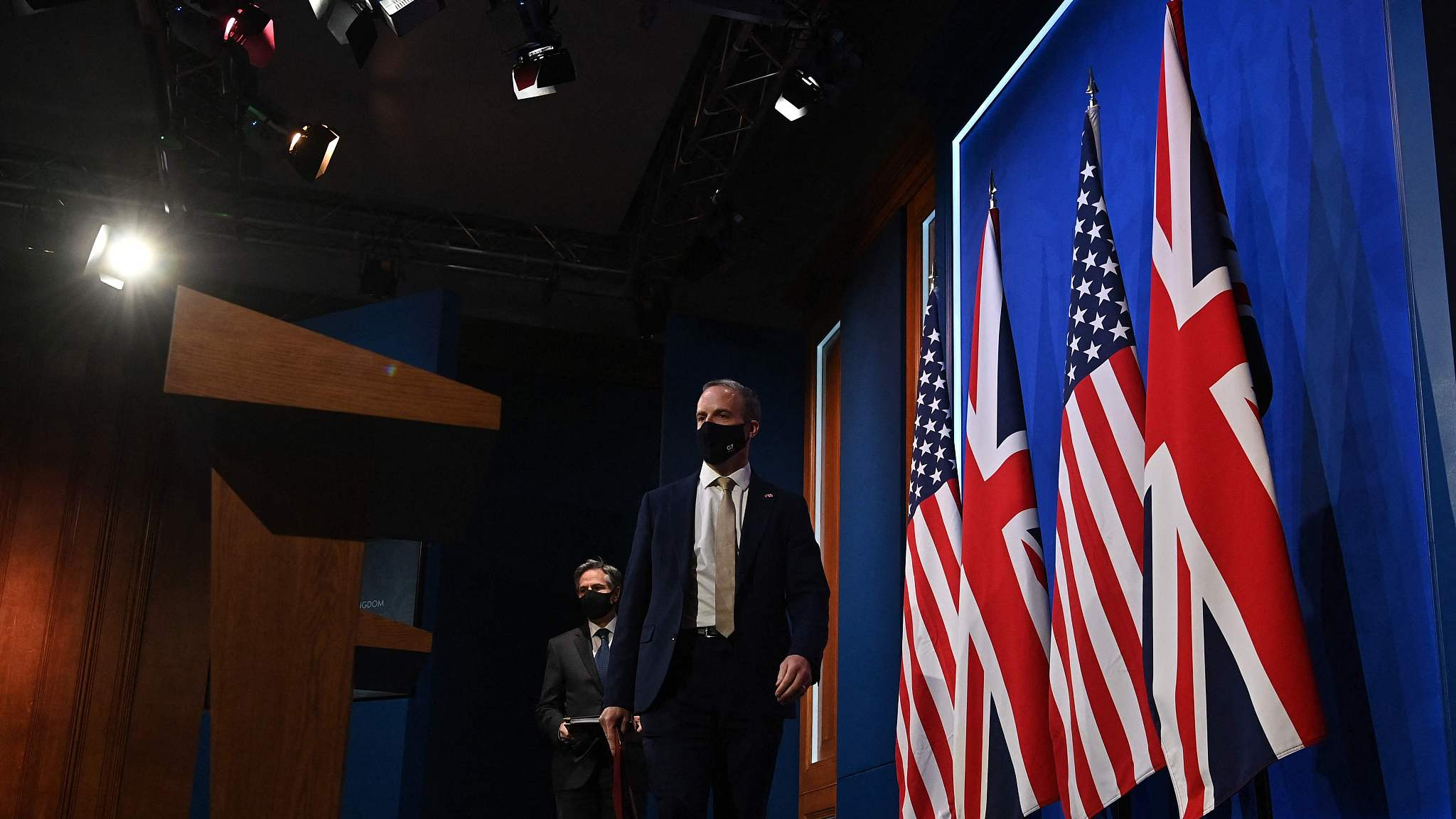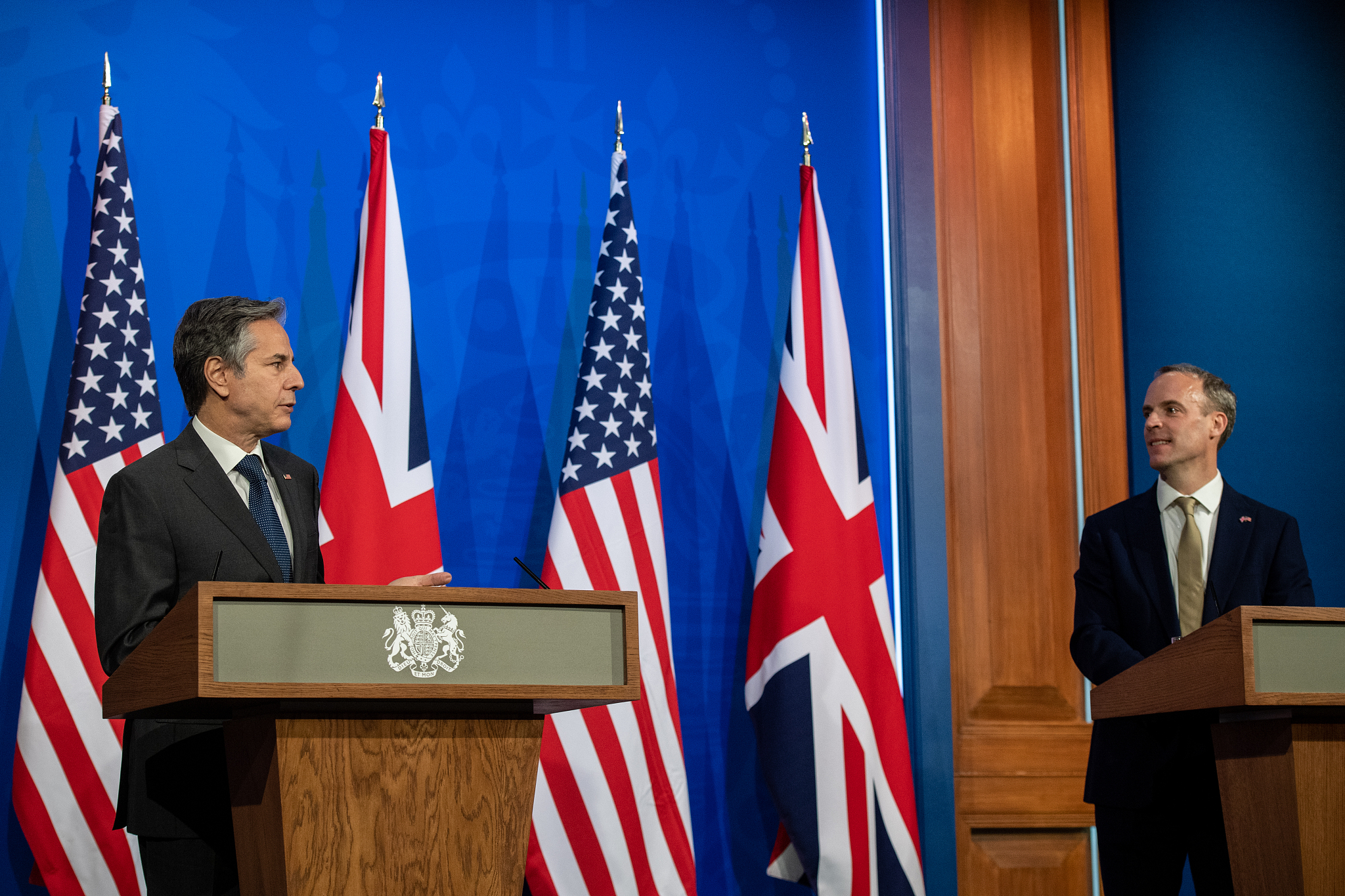
Britain's Foreign Secretary Dominic Raab (R) attends a press conference with U.S. Secretary of State Antony Blinken following their bilateral meeting during the G7 Foreign Ministers' Meeting, in London, May 3, 2021. /Getty
Britain's Foreign Secretary Dominic Raab (R) attends a press conference with U.S. Secretary of State Antony Blinken following their bilateral meeting during the G7 Foreign Ministers' Meeting, in London, May 3, 2021. /Getty
Editor's note: Jonathan Arnott is a former member of the European Parliament. The article reflects the author's opinions and not necessarily the views of CGTN.
I'm writing this shortly after the first day of the G7 Foreign and Development Ministers' Meeting in London. It's been two years since this high-profile meeting of many of the world's largest economies took place in person. For just a moment, it seemed that everything was back to normal. Zoom diplomacy had gone out of the window, and foreign ministers started to discuss the major challenges facing the world today.
It was time to send out a statement, to talk about the most pressing issues facing the globe today. Surely there could only be one issue worthy of headline news. It seems inconceivable that, as the pandemic has gripped India to the point that patients have been dying for lack of oxygen supplies, any other topic could possibly find its way to the top of the list.
There is a debate ongoing in the UK about a recent cut to its Overseas Aid budget, from 0.7 percent of its GDP to 0.5 percent. That should be a side-issue: such aid comes in many forms. Years ago, I remember questioning why the U.K should be sending aid to a country, such as India, which has both a nuclear and a space program.
In other words, I believe, aid should be targeted. Its primary purpose should be to deal with large-scale humanitarian disasters, responding at lightning speed. Its second aim should be to build infrastructure, developing free and fair trade which will ultimately benefit all parties involved. There is no intellectual inconsistency from any politician who argues in favor of the cut on that basis, whilst shouting from the rooftops that we should be doing more to help India.
Today, though, it felt as though the G7 were living in a parallel universe. They chose to spend their day criticizing China and Russia. U.S. Secretary of State Antony Blinken said that their intent was not to "contain China" or to "hold China down," but rather to protect "the international rules-based order." The British media reported Blinken's words as marking a complete departure from Donald Trump, who they said had shown a blatant disregard for that "rules-based order."

Britain's Foreign Secretary Dominic Raab (right) and U.S. Secretary of State Antony Blinken during a press conference at Downing Street in London, May 3, 2021. /Getty
Britain's Foreign Secretary Dominic Raab (right) and U.S. Secretary of State Antony Blinken during a press conference at Downing Street in London, May 3, 2021. /Getty
In truth, the policies are not so far apart. It is style rather than substance which has changed. Twitter diplomacy may have been replaced by conventional diplomacy, with the obvious change being that the new U.S. administration places a greater emphasis on building allies across the West. When Donald Trump took action against China, he did so unilaterally. The G7 today spoke instead of clusters of like-minded countries.
I believe there will inevitably be long-term questions about how Western democracies interact with the growing influence of China on the world economy. There is not only a cultural dividing line in the traditional sense, but also one in terms of the approach to the fundamental nature of what government should achieve.
The West focuses on rights for the individual; China on a practical approach to the overall public good. The West focuses on short-term changes driven by the next election; China on improvements spanning generations. The West has eroded the strength of the nation-state; China is fiercely protective of its territorial integrity. Such questions will not be answered overnight.
Today, all of that should have been a side issue. The meeting, called a "Foreign Ministers'" meeting in the media, was actually a "Foreign and Development Ministers" meeting. Some international assistance has been forthcoming towards India, but more is clearly needed urgently. The United Kingdom has sent some aid; the United States has (belatedly) done likewise. As regards China, the Western media merely reports a now-deleted social media post. The tweet was indeed ill-advised, and it was deleted because the error was recognized. Yet that single tweet has been given greater prominence than the thousands of oxygen concentrators which China has sent to India to help.
The G7 meeting provides the perfect opportunity for urgent cooperation on an unprecedented scale to help India. That, surely, should be the most important part of the agenda.
(If you want to contribute and have specific expertise, please contact us at opinions@cgtn.com.)

